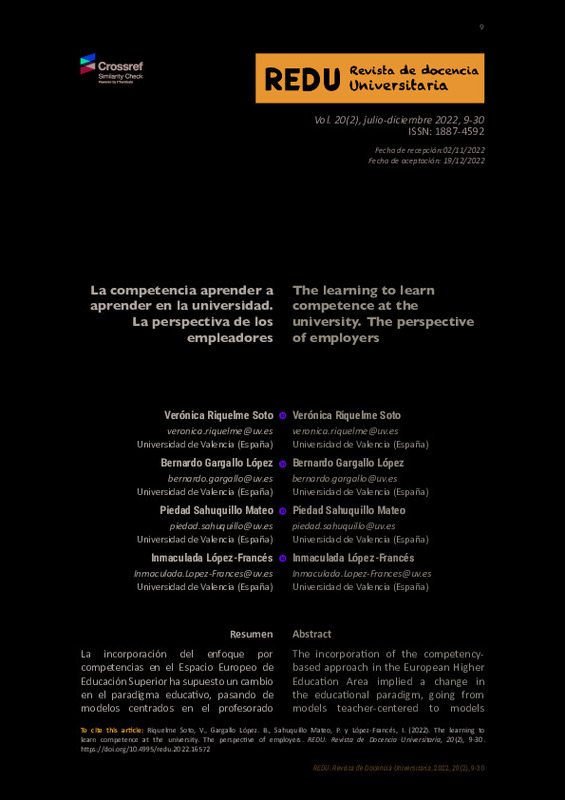Ballester, Ll., Nadal, A. y Amer, J. (2017). Métodos de investigación educativa. Universidad de las Islas Baleares.
Boekaerts, M. (2006). Self-regulation and effort investment. En E. Sigel y K.A. Renninger (eds.), Handbook of Child Psychology: Child Psychology in Practice (pp. 345-377). John Wiley & Sons. https://doi.org/10.1002/9780470147658.chpsy0409
Caena, F. (2019). Developing a European Framework for the Personal, Social & Learning lo Learn Key Competence. Publications Office of the European Union. https://bit.ly/2vBzK8A
[+]
Ballester, Ll., Nadal, A. y Amer, J. (2017). Métodos de investigación educativa. Universidad de las Islas Baleares.
Boekaerts, M. (2006). Self-regulation and effort investment. En E. Sigel y K.A. Renninger (eds.), Handbook of Child Psychology: Child Psychology in Practice (pp. 345-377). John Wiley & Sons. https://doi.org/10.1002/9780470147658.chpsy0409
Caena, F. (2019). Developing a European Framework for the Personal, Social & Learning lo Learn Key Competence. Publications Office of the European Union. https://bit.ly/2vBzK8A
Comisión Europea. (2006). Recomendación del Parlamento Europeo y del Consejo de 18 de diciembre de 2006 sobre competencias clave para el aprendizaje permanente. https://goo.gl/6ayK8K
Comisión Europea. (2018). Recomendación del Consejo de 22 de mayo de 2018 relativa a las competencias clave para el aprendizaje permanente. https://bit.ly/2J7ZmgK
Creswell, J.W. (2005). Educational research: Planning, conducting, and evaluating quantitative and qualitative research. Pearson.
Ehlers, U.D., Kellermann,S.A. (2019). The Future Skills Report. International Delphi Survey on the Next Skills Project. Baden-Wurttemberg-Cooperative State University.
Elo, S., Kyngäs. H. (2008). The qualitative content analysis process. Journal of Advanced Nursing, 62(1), 107–115. https://doi.org/10.1111/j.1365-2648.2007.04569.x
Eos, J. (2019). Understanding student-centered learning in higher education: students’ and teachers’ perceptions, challenges, and cognitive gaps. Journal of Further and Higher Education, 44 (8), 1013-1023. https://doi.org/10.1080/0309877X.2019.1636214
European Student Union. (2015). Overview on Student-Centered Learning in Higher Education in Europe: Research Study. http://bit.ly/2HumqGW
European University Association. (2018). Learning and Teaching in Europe’s Universities: An EUA position paper. EUA. https://bit.ly/2wn07PU
Friese, S. (2019). Qualitative data analysis with Atlas.ti. Sage.
Fullana, J., Pallisera, M., Colomer, J., Fernández-Peña, R. & Pérez-Burriel, M. (2016). Reflective learning in higher education: a qualitative study on students’ perception. Studies in Higher Education, 41(6), 1008-1022. https://doi.org/10.1080/03075079.2014.950563
Gargallo, B. (2017) (Coord.). Enseñanza centrada en el aprendizaje y diseño por competencias en la universidad. Tirant lo Blanch.
Gargallo, B., Pérez-Pérez, C., García-García, F.J., Giménez-Beut, J.A., Portillo, N. (2020). La competencia aprender a aprender en la universidad: propuesta de modelo teórico. Educación XX1, 23(1), 19-44. https://doi.org/10.5944/educxx1.23367
González, J., Wagenaar, R. (2003). Tuning Educational Structures in Europe. Universidad de Deusto.
Gover, A., Loukkola, T., Peterbauer, H. (2019). Student-centered learning: approaches to quality assurance. EUA. https://bit.ly/2uOZhagEUAQ8mg
Hautamäki, J., Arinen, P., Eronen, S., Hautamäki, A., Kupianien, S., Lindblom, B., … & Scheinin, P. (2002). Assessing Learning-to-Learn: A Framework. Centre for Educational Assessment.
Hortigüela, D., Palacios, A., López, V. (2019). The impact of formative and shared or co-assessment on the acquisition of transversal competences in higher education. Assessment & Evaluation in Higher Education, 44(6), 933–945. https://doi.org/10.1080/02602938.2018.1530341
Hoskins, B., Fredriksson, U. (2008). Learning to learn: what is it and can it be measured. Joint Research Centre, Institute for the Protection and Security of the Citizen.
Hsieh H.F., Shannon S. (2005). Three approaches to qualitative content analysis. Qualitative Health Research, 15, 1277–1288. https://doi. org/10.1177/1049732305276687
Jornet, J.J., García-Bellido, R., González-Such, J. (2012). Evaluar la competencia aprender a aprender: una propuesta metodológica. Profesorado. Revista de currículum y formación del profesorado, 16(1), 103-123.
López, C., Benedito, V., León, M.J. (2016). El enfoque de competencias en la formación universitaria y su impacto en la evaluación. La Perspectiva de un grupo de profesionales expertos en Pedagogía. Formación Universitaria, 9(4), 11-22. https://doi.org/10.4067/S0718-50062016000400003
Neuendorf, K.A. (2017). The Content Analysis Guidebook. Sage. https://doi.org/10.4135/9781071802878
OCDE. (2002). Definition and Selection of Competencies: Theoretical and Conceptual Foundations. OCDE.
OCDE. (2005). La definición y selección de competencias clave. OCDE.
Panadero, E. (2017). A Review of Self-Regulated Learning: Six Models and Four Directions for Research. Frontiers in Psychology, 8(422), 1-28. https://doi.org/10.3389/fpsyg.2017.00422
Pintrich, P.R. (2004). A conceptual framework for assessing motivation and self-regulated learning in college students. Educational Psychology Review, 16(4), 385-407. https://doi.org/10.1007/s10648-004-0006-x
Renz, M., Carrington, J.M., Badger, T.A. (2018). Two strategies for qualitative content analysis: an intramethod approach to triangulation. Qualitative Health Research, 28(5), 824-831. https://doi.org/10.1177/1049732317753586
Säfström, C.A. (2018). Liveable life, educational theory and the imperative of constant change. European Educational Research Journal, 17(5), 621-630. https://doi.org/10.1177/1474904118784480
Saldaña, J. (2013). The Coding Manual for Qualitative Researchers. Sage.
Stringher, C. (2014). What is learning to learn? A learning to learn process and output model. En R. Deakin Crick, C. Stringher, y K. Ren (Eds.), Learning to learn (pp. 9-32). Routledge. https://doi.org/10.4324/9780203078044-2
Thoutenhoofd, E.D., Pirrie, A. (2015). From self-regulation to learning to learn: observations on the construction of self and learning. British Educational Research Journal, 41(1), 72-84. https://doi.org/10.1002/berj.3128
Trautwein, C., Bosse, E. (2017). The first year in higher education-critical requirements from the student perspective. Higher Education, 73(3), 371-387. https://doi.org/10.1007/s10734-016-0098-5
Trilling, B., C. Fadel (2009). 21st Century Skills. Learning for Life in our Times. Jossey-Bass.
Weinstein, C.E. (1987). LASSI User’s Manual. H&H and Publishing Company.
Weinstein, C.E., Mayer, R.E. (1985). The teaching of learning strategies. In M.C. Wittrock, (Ed.), Handbook of research on teaching (pp. 315-327). MacMillan.
Yip, M.C.W. (2012). Learning strategies and self-efficacy as predictors of academic performance: a preliminary study. Quality in Higher Education, 18(1), 23-34. https://doi.org/10.1080/13538322.2012.667263
Zimmerman, B.J. (1989). A social cognitive view of self-regulated academic learning. Journal of Educational Psychology, (81), 329–339. https://doi.org/10.1037/0022-0663.81.3.329
Zimmerman, B.J. (2013). From cognitive modeling to self-regulation: a social cognitive career path. Journal of Educational Psychology, 48, 135–147. https://doi.org/10.1080/00461520.2013.794676
[-]









